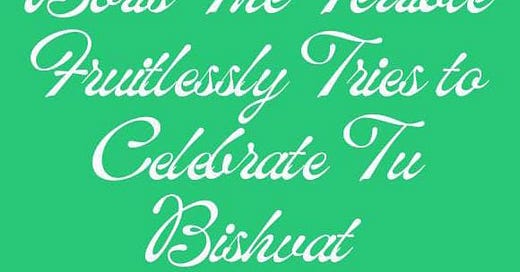(Introduction: You may remember Boris the Terrible from Rosh Hashanah and Hanukkah. Boris lived in Chelm, a small, isolated town surrounded by a ring of volcanoes. Boris hated the Jews and their G-d, but he was forced to stock his grocery store in order to keep his monopoly on grocery stores in his small town. Every time Boris the Terrible learned about a new Jewish tradition or holiday, he tried his best to sabotage it as much as he could, but it never worked, and somehow he ended up suffering even more.)
When Boris the Terrible heard about Tu Bishvat, the new year for trees, he figured it was no big deal. Like half the Jews he knew didn't do anything for it. Maybe it wasn't even a real holiday.
But he had to stock the store just in case, so he found out that it is the "New Year For Trees". What does that even mean? It sounded like a tree-huggers dream, and Boris hated people like that, just like he hated everyone else . He hoped only a few people would be interested in celebrating this holiday.
Sadly, it seemed that everyone in Chelm was excited about Tu Bishvat. Maybe this was because Tu Bishvat is not terribly controversial. It is traditional enough for the traditional people to enjoy, and also progressive enough for the most ardent environmentalists to enjoy.
Boris asked the Rabbi, "How could a tree experience a new year holiday? And didn't we already celebrate the Jewish new year on Rosh Hashanah?" The Rabbi explained that the Jewish New Year, for people, is the day G-d judges the human race for that year, and writes down who will be written in the Book of Life.
Of course, the Rabbi pointed out, trees do not talk or walk or celebrate anything. Obviously they cannot get judged the same way people are judged. For trees, this means G-d decides how much rain will fall to sustain them this year, which is life or death for the tree. On this day, G-d also decrees the quantity and quality of the fruit they will produce.
Boris was really annoyed by this idea. He did not like the idea of G-d caring about trees, or people. Boris was evil, and believed that he personally was in charge of how things turn out in the world. He had an awful idea to punish the trees. Boris gleefully took out his electric drill.
Boris thought, "I'll show G-d who decides if trees live or die! I will kill all the trees!" He walked around drilling holes in every tree he could find. This usually kills trees. It only took an hour of drilling for a neighbor to report him to the police, who jailed him overnight.
Boris had accidentally drilled holes only in maple trees. The Jews thought of a brilliant idea. They attached pipes to all the maple trees that had been drilled, and there was delicious maple syrup that Tu Bishvat, thanks to Boris's drilling.
Boris found out, from a book someone had left in the store, that Shvat is the month that signifies the end of the winter, and Tu Bishvat refers to the 15th day of the month of Shvat. Tu sounds like Two in English, the language spoken in Chelm. Boris hoped to confuse people that it was the second day of Shvat, and had already passed.
Boris, on the second day of Shvat: Today is day Two of Shvat! Don't you want to buy some expensive fruit?
Alas, not a single person was fooled. They were eager to correct his "mistake". By the end of the day, Boris knew more than he'd ever wanted to know about Tu Bishvat and the Jewish calendar.
Boris asked a frazzled-looking woman holding two toddlers and buying milk why she wanted to celebrate Tu Bishvat. He figured she wouldn't have the patience for a long explanation. Boy, was he wrong.
The woman, expertly balancing two children and a gallon of milk, was delighted to be asked.
Multitasking mother: "The Bible says that "Man is a tree of the field"(*). What this means is a bit complicated , but I'll do my best, until my kids start to cry.
"People have a spiritual side, above the earth, that reaches for the heavens, and wants to be nourished by a connection to G-d.
"A person's arms and legs are like branches, through which they can perform good deeds, and upon which the "fruits" of their labor are grown.
"Finally, the physical part of a person is in the earth. Like the roots of the tree, man comes from dust and returns to dust.
"I'm going to put my kids down for a nap, but I can answer more later."
Boris did not like this answer, which was a bit too spiritual for his tastes. Next, he approached a PhD student named Eric, who liked to wear a Coexist T-shirt and a baseball cap, and asked him what he was going to do for Tu Bishvat.
But Eric said that it was traditional to eat from the seven species for which G-d praised the land of Israel: "...a land of wheat and barley and grape vines and fig trees and pomegranates, a land of olive trees and date honey."
Eric was not at all religious, but he was even more spiritual than the lady with the toddlers. Turned out that Eric had recently begun studying Kabbalah. Eric said that the kabbalistic custom is to eat fifteen different types of fruits, corresponding to the 15th of Shivat, while saying the 15 Songs of the Steps in Psalms. He warmly invited Boris to come celebrate with him.
Boris said no.
Finally, Boris asked a visiting Hasidic Rabbi how he liked to celebrate Tu Bishvat. The Rabbi said that he has a tradition to pray for a beautiful, kosher, etrog on this day. Also, he made a Seder, similar to the Passover Seder, where he ate the seven special species, many fruits, and especially fruit from the land of Israel.
The day before Tu Bishvat, Boris decided to try the different fruits he had purchased. When he bit into the bukser, the dried carob, his teeth fell off. (Boris had always been terrible about brushing his teeth.) Boris spent that Tu Bishvat at his dentist, racking up a fifteen thousand dollar dentist bill. He never tried bukser again. Everyone else in Chelm had a wonderful Tu Bishvat.
(*) Devarim 20:19
(**) For most sources, see https://ohr.edu/holidays/tu_bshvat/
Thank you to Rabbi Moshe Newman, of Ohr Somayach, for written permission to use their site as a source.
Postscript: I will be indebted to anyone who tells me how to delete an image without deleting the entire post.







>The Bible says that "Man is a tree of the field."
Actually, it says the opposite - that a tree is not a Man, but the quote is often exegetically reinterpreted as comparing man to a tree.
En Espanol:
Isha Yiras Hashem en Substack
Boris el Terrible intenta sin éxito celebrar Tu B'Shvat
(Introducción: quizás recuerdes a Boris el Terrible de Rosh Hashanah y Hanukkah. Boris vivía en Chelm, un pueblo pequeño y aislado rodeado por un anillo de volcanes. Boris odiaba a los judíos de su pueblo, pero se vio obligado a abastecer su tienda de comestibles para para mantener su negocio Cada vez que Boris el Terrible se enteraba de una nueva tradición o festividad judía, hacía todo lo posible para sabotearla, pero nunca funcionó, y de alguna manera terminó sufriendo aún más.)
Cuando Boris el Terrible se enteró de Tu B'Shvat, el año nuevo de los árboles, pensó que no era gran cosa. Aproximadamente la mitad de los judíos que conocía no hicieron nada por ello. Tal vez ni siquiera era un verdadero día sagrado.
Pero tuvo que abastecer su tienda por si acaso, así que descubrió que es el "Año Nuevo de los árboles". ¿Y qué significa eso? Sonaba como un sueño de abrazar un árbol, y Boris odiaba a la gente así, al igual que odiaba a todos los demás. Esperaba que solo unas pocas personas estuvieran interesadas en celebrar esto.
Lamentablemente, parecía que todos en Chelm estaban entusiasmados con Tu B'Shvat. Quizás esto se debió a que Tu B'Shvat no es terriblemente controvertido. Es lo suficientemente tradicional para que la gente tradicional lo disfrute, y también lo suficientemente progresista para que lo disfruten los ecologistas más apasionados.
Boris le preguntó al rabino: "¿Cómo podría un árbol experimentar una fiesta de Año Nuevo? ¿Y no celebramos ya el Año Nuevo judío en Rosh Hashaná?" El rabino explicó que el Año Nuevo judío, para el pueblo, es el día en que Di-s juzga a la raza humana para ese año y escribe quiénes estarán inscritos en el Libro de la Vida.
Por supuesto, señaló el rabino, los árboles no hablan ni caminan ni celebran nada. Obviamente no pueden ser juzgados de la misma manera que se juzga a las personas. Para los árboles, esto significa que Di-s decide cuánta lluvia caerá para sostenerlos este año, lo cual es de vida o muerte para el árbol. En este día, Di-s también decreta la cantidad y calidad del fruto que producirán.
Boris estaba realmente molesto por esta idea. No le gustaba la idea de que Di-s se preocupara por los árboles o las personas. Boris era malvado y creía que él personalmente estaba a cargo de cómo resultaban las cosas en el mundo. Tuvo una idea horrible para castigar a los árboles. Boris recibió con alegría su taladro eléctrico.
Boris pensó: "¡Le mostraré a Di-s quién decide si los árboles viven o mueren! ¡Mataré a todos los árboles!" Caminó perforando agujeros en cada árbol que pudo encontrar. Esto generalmente mata árboles. Solo tomó una hora para que un vecino lo denunciara a la policía, que lo encarceló durante la noche.
Boris había taladrado accidentalmente agujeros solo en arces. Los judíos pensaron en una idea brillante. Conectaron tuberías a todos los árboles de arce que habían sido perforados, y hubo un delicioso jarabe de arce que Tu B'Shvat, gracias a la perforación de Boris.
Boris descubrió, por un libro que alguien había dejado en la tienda, que Shvat es el mes que significa el final del invierno, y Tu B'Shvat se refiere al día 15 del mes de Shvat. Tu suena como dos en inglés, el idioma que se habla en Chelm. Boris esperaba confundir a la gente de que era el segundo día de Shvat y ya había pasado.
Boris, en el segundo día de Shvat: ¡Hoy es el segundo día de Shvat! ¿No queréis comprar fruta cara?
Desafortunadamente, ni una sola persona fue engañada. Estaban ansiosos por corregir su "error". Al final del día, Boris sabía más de lo que nunca quiso saber sobre Tu B'Shvat y el calendario judío.
Boris le preguntó a una mujer de aspecto exhausto que cargaba a dos niños pequeños y compraba leche por qué quería celebrar Tu B'Shvat. Supuso que ella no tendría paciencia para una larga explicación. Chico, estaba equivocado.
La mujer, que balanceaba hábilmente a dos niños y un galón de leche, estaba encantada de que le preguntaran.
Mamá multitarea: “La Biblia dice que 'El hombre es un árbol del campo' (*). Lo que esto significa es un poco complicado, pero haré lo mejor que pueda, hasta que mis hijos empiecen a llorar.
"La gente tiene un lado espiritual, por encima de la tierra, que alcanza los cielos y quiere ser alimentado por una conexión con Di-s.
"Los brazos y las piernas de una persona son como ramas, a través de las cuales puede realizar buenas obras, y en las que crecen los "frutos" de su trabajo.
“En última instancia, la parte física de una persona está en la tierra. Como las raíces del árbol, el hombre viene del polvo y vuelve al polvo.
"Voy a poner a mis hijos a dormir la siesta, pero puedo responder más tarde".
A Boris no le gustó esta respuesta, demasiado espiritual para su gusto. A continuación, se le acercó un estudiante de posgrado llamado Eric, a quien le gustaba usar una camiseta de Coexist y un pero él era aún más espiritual que la señora con los niños pequeños. Resultó que Eric había comenzado recientemente a estudiar Cabalá. Eric dijo que la costumbre cabalística es comer quince tipos diferentes de frutas, correspondientes al día 15 de Shivat, mientras se dicen las 15 Canciones de los Pasos en los Salmos. Invitó calurosamente a Boris a que viniera a celebrar con él.
boris dijo que no
Finalmente, Boris le preguntó a un rabino jasídico visitante cómo le gustaba celebrar Tu Bishvat. El rabino dijo que tiene la tradición de orar por un hermoso etrog kosher en este día. Además, hizo un Seder, similar al Seder de Pesaj, donde comió las siete especies especiales, muchas frutas, y especialmente frutas de la tierra de Israel.
El día antes de Tu Bishvat, Boris decidió probar las diferentes frutas que había comprado. Cuando mordió el bukser, la algarroba seca, se le cayeron los dientes. (Boris siempre había sido terrible para cepillarse los dientes). Boris gastó ese Tu Bishvat en su dentista, acumulando una factura de dentista de quince mil dólares. Nunca más probó bukser. Todos los demás en Chelm tuvieron un maravilloso Tu Bishvat.
(*) Devarim 20:19
(**) Para la mayoría de las fuentes, consulte https://ohr.edu/holidays/tu_bshvat/
Gracias al rabino Moshe Newman, de Ohr Somayach, por el permiso por escrito para usar su sitio como fuente.
Posdata: estaré en deuda con cualquiera que me diga cómo eliminar una imagen sin eliminar toda la publicación.